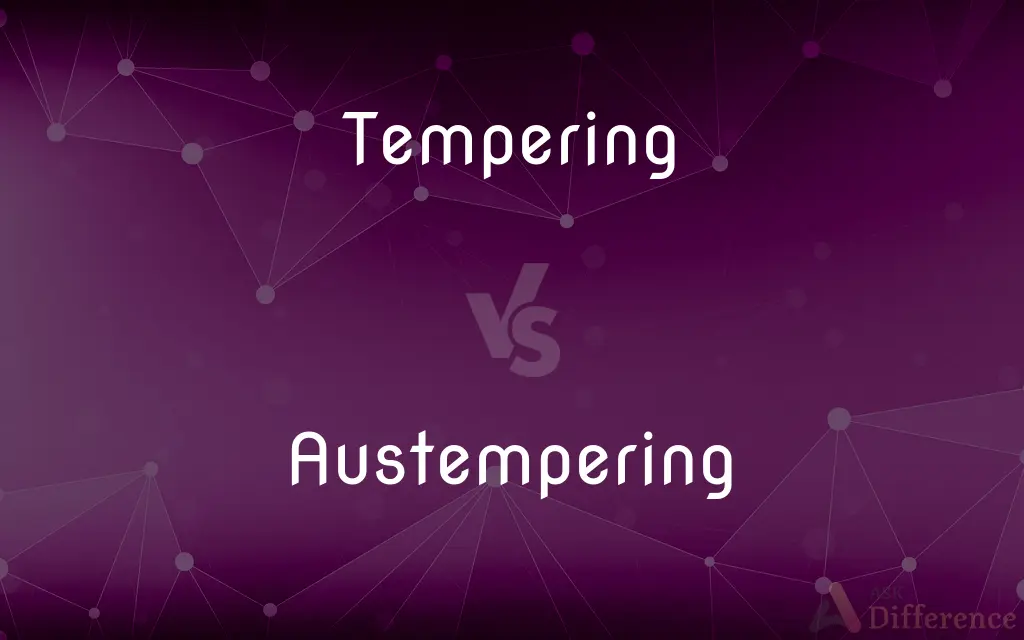Tempering vs. Austempering — What's the Difference?
Edited by Tayyaba Rehman — By Fiza Rafique — Published on October 1, 2023
Tempering involves reheating quenched steel to improve toughness, while austempering is a heat treatment process resulting in a bainitic microstructure for enhanced strength and toughness.

Difference Between Tempering and Austempering
Table of Contents
ADVERTISEMENT
Key Differences
Tempering is a metallurgical process that involves reheating quenched steel to a certain temperature to enhance its toughness. Austempering, on the other hand, is a specific type of heat treatment designed to produce a bainitic microstructure in ferrous metals.
In the tempering process, steel, after being hardened by quenching, is re-heated to below its critical temperature. In contrast, austempering involves quenching steel from the austenitizing temperature into a bath maintained at the desired austempering temperature.
The main goal of tempering is to reduce the brittleness of quenched steel. With austempering, the objective is not just to reduce brittleness but to achieve a specific bainitic structure that offers a combination of strength and ductility.
Tempering results in a microstructure comprised mainly of ferrite and cementite, while austempering produces a bainitic structure. This difference in the resulting microstructures leads to variations in mechanical properties.
While tempering is a widely-used process for various steel components, austempering is particularly preferred for applications requiring higher impact resistance and fatigue strength due to the unique properties of the bainitic structure.
ADVERTISEMENT
Comparison Chart
Definition
Reheating quenched steel to improve toughness
Heat treatment for a bainitic structure
Objective
Reduce brittleness
Achieve strength and ductility with bainitic structure
Process
Re-heat quenched steel below its critical temperature
Quench from austenitizing temperature into a bath
Resulting Microstructure
Ferrite and cementite
Bainitic
Common Applications
General steel components
Components needing higher impact resistance and fatigue strength
Compare with Definitions
Tempering
A process to enhance steel toughness.
After quenching, the blade underwent tempering to ensure durability.
Austempering
A heat treatment for bainitic microstructure.
The gear benefited from austempering, ensuring both strength and ductility.
Tempering
Reheating quenched steel to reduce brittleness.
The engineer suggested tempering to improve the part's resilience.
Austempering
Quenching steel for a bainitic outcome.
For certain applications, austempering surpasses traditional tempering.
Tempering
A method to adjust steel's mechanical properties.
Tempering can tailor a metal piece's hardness and strength.
Austempering
A method to achieve high strength and toughness.
The automotive industry often relies on austempering for critical components.
Tempering
A heat treatment following quenching.
The workshop specializes in both quenching and tempering.
Austempering
Producing steel with a bainitic structure.
Austempering transformed the metal's microstructure to a desired bainitic form.
Tempering
Modifying steel's microstructure post-quenching.
Proper tempering can prevent unwanted cracks in steel products.
Austempering
Treatment for ferrous metals for specific properties.
Austempering was chosen for its unique structural results.
Tempering
To modify by the addition of a moderating element; moderate
"temper its doctrinaire logic with a little practical wisdom" (Robert H. Jackson).
Austempering
Austempering is heat treatment that is applied to ferrous metals, most notably steel and ductile iron. In steel it produces a bainite microstructure whereas in cast irons it produces a structure of acicular ferrite and high carbon, stabilized austenite known as ausferrite.
Tempering
To bring to a desired consistency, texture, hardness, or other physical condition by blending, admixing, or kneading
Temper clay.
Paints that had been tempered with oil.
Austempering
Present participle of austemper
Tempering
To harden or strengthen (metal or glass) by application of heat or by heating and cooling.
Tempering
To strengthen through experience or hardship; toughen
Soldiers who had been tempered by combat.
Tempering
(Music) To adjust (the pitch of an instrument) to a temperament.
Tempering
To be or become tempered.
Tempering
A state of mind or emotion; disposition
An even temper.
Tempering
Calmness of mind or emotions; composure
Lose one's temper.
Tempering
A tendency to become easily angry or irritable
A quick temper.
Tempering
Anger; rage
A fit of temper.
Tempering
A characteristic general quality; tone
Heroes who exemplified the medieval temper.
The politicized temper of the 1930s.
Tempering
The condition of being tempered.
Tempering
The degree of hardness and elasticity of a metal, chiefly steel, achieved by tempering.
Tempering
A modifying substance or agent added to something else.
Tempering
(Archaic) A middle course between extremes; a mean.
Tempering
Present participle of temper
Tempering
The act by which something is tempered.
Tempering
The process of giving the requisite degree of hardness or softness to a substance, as iron and steel; especially, the process of giving to steel the degree of hardness required for various purposes, consisting usually in first plunging the article, when heated to redness, in cold water or other liquid, to give an excess of hardness, and then reheating it gradually until the hardness is reduced or drawn down to the degree required, as indicated by the color produced on a polished portion, or by the burning of oil.
Tempering
Hardening something by heat treatment
Tempering
Moderating by making more temperate
Common Curiosities
Why is tempering important?
Tempering ensures that quenched steel is not overly brittle, making it suitable for various applications.
What's the outcome of tempering on steel's microstructure?
Tempering results in a microstructure mainly of ferrite and cementite.
What is tempering?
Tempering is reheating quenched steel to improve its toughness and reduce brittleness.
Why choose austempering over traditional tempering?
Austempering provides a unique combination of strength and ductility due to its bainitic structure.
Can all steel types undergo austempering?
Not all steels are suitable for austempering; it depends on the steel's composition and intended application.
What metals undergo austempering?
Austempering is typically used for ferrous metals, especially certain types of steel.
How long does the austempering process take?
The duration varies depending on the material and desired properties, but it often lasts several hours.
How many times can a metal be tempered?
Metal can be tempered multiple times, but each cycle may alter its properties.
Are there risks with improper tempering?
Yes, improper tempering can lead to reduced mechanical properties or undesired microstructures.
How does austempering differ from tempering?
Austempering aims to produce a bainitic microstructure, offering unique strength and ductility.
At what temperature is steel tempered?
Steel is tempered below its critical temperature, the specific value depending on the desired properties.
Is tempering only related to metals?
While commonly associated with metals, "tempering" can also refer to processes in glassmaking and chocolate production.
What industries primarily use austempering?
The automotive, aerospace, and tool-making industries often use austempering due to its benefits.
Share Your Discovery

Previous Comparison
Rival vs. Competitor
Next Comparison
Balance of Trade vs. Balance of PaymentsAuthor Spotlight
Written by
Fiza RafiqueFiza Rafique is a skilled content writer at AskDifference.com, where she meticulously refines and enhances written pieces. Drawing from her vast editorial expertise, Fiza ensures clarity, accuracy, and precision in every article. Passionate about language, she continually seeks to elevate the quality of content for readers worldwide.
Edited by
Tayyaba RehmanTayyaba Rehman is a distinguished writer, currently serving as a primary contributor to askdifference.com. As a researcher in semantics and etymology, Tayyaba's passion for the complexity of languages and their distinctions has found a perfect home on the platform. Tayyaba delves into the intricacies of language, distinguishing between commonly confused words and phrases, thereby providing clarity for readers worldwide.
















































